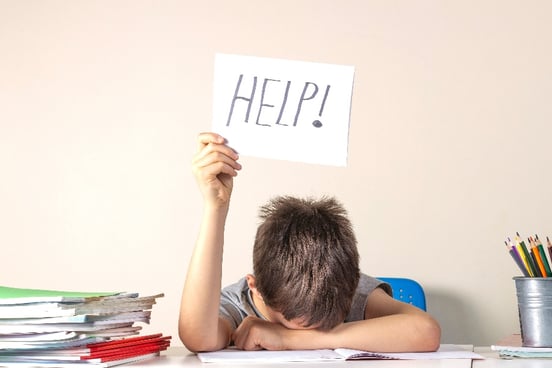
STEM Education Resources Teachers Actually Need in 2026
STEM brings together science, technology, engineering, and math in a connected way.
ALI Staff | Published January 20, 2023 | Updated October 21, 2025
Remember the first time you noticed a student's hands shake during a math test? Or that student who suddenly had to use the bathroom every time math rolled around?
That's math anxiety in action, and it's more common than you might think.
Teachers and administrators play a critical role in helping students navigate through their fear of math and general math stress.
This blog serves as your toolkit, with effective strategies and fresh insights to empower your learners. It shows how to address math anxiety head-on and turn nervous moments into chances for confidence and success.
Read to learn:

When students feel stress or fear when faced with math, they may be experiencing math anxiety.
According to the American Psychological Association, math anxiety is “a feeling of tension and apprehension that interferes with math performance.” This definition helps show that the problem goes beyond disliking math. It affects how students think and perform in the moment.
There is also a related term, arithmophobia, which refers to an actual phobia of math. While math anxiety is common in classrooms, arithmophobia is more severe and can cause students to avoid math in every setting.
Math trauma can follow a person into adulthood. It is more than feeling nervous when asked to solve a problem or getting frustrated during homework. These feelings turn into anxiety when a student reacts emotionally to math no matter the situation. For example, if answering 3 + 5 in class causes sweaty palms, that is a sign of math anxiety.
On a physical level, math anxiety can cause brain freeze. Students may also experience a fight-or-flight response, where the brain treats a math task as a source of danger. This reaction makes it hard for them to think clearly or complete even simple calculations.
Ignoring math anxiety or assuming a student will outgrow it can cause long-term issues. A student may convince themselves they are bad at math when they are not. This belief can follow them into adulthood and even limit career options.
Math anxiety can start for many different reasons. A bad experience with a teacher or parent can create math trauma that stays with a student for years. Even one moment of embarrassment over a wrong answer can spark a lasting fear of math.
Pressure to get high grades can also lead to math stress. Some students begin to think that only certain people are “good at math.” This stereotype can discourage learners who are already unsure of themselves.
The way math is taught plays a role too. For some, the subject feels too abstract and hard to connect with daily life. Timed tests and big exams can trigger the body’s fight-or-flight response. In those moments, a student may freeze or feel unable to think.
Over time, these experiences build on each other. Instead of seeing math as a skill they can grow, students may come to view it with frustration or even a true phobia of math.
Math anxiety can show up in many ways. Some signs are easy to see, while others are more hidden.
One of the most common feelings is a “mountain of dread.” Even simple math tasks feel overwhelming. A student may freeze in front of the class, unable to answer a question they know, because their brain has gone blank.
Students may experience emotional, physical, or behavioral reactions, and often more than one at the same time.
Emotional signs include panic, frustration, and self-doubt. A student might say they are “just not good at math” even when they have shown skill.
Physical signs can include sweating, a rapid heartbeat, or even stomachaches during math time. These are real stress responses that make it hard to focus.
Behavioral signs often show up as avoidance. A student might avoid eye contact, make excuses to leave the room, or try to skip homework. Some may distract others or act out to get out of doing math.
Symptoms of math anxiety can appear in even young learners. Spotting them early helps teachers and parents give the right support before fear of math grows stronger.
Recognizing math anxiety is the first step to helping students manage it. It is not only about who struggles with numbers. Teachers need to notice small changes in behavior and attitude toward math.
A student may not always say they feel anxious, but their actions give clues. In the classroom, this may look like a student who avoids joining math activities or hesitates to answer questions. At home, it may show up as avoiding homework or making excuses to skip assignments.
Some signs are more subtle. A student may ask for extra help on problems they already know how to solve. Others may show perfectionist habits, refusing to move on until every answer is correct.
Open and supportive communication is key. When students feel safe to share their concerns, teachers and parents can better understand what is happening and respond in a helpful way.
The effects of math anxiety go far beyond test scores. This fear can lower confidence and make learning harder. When students feel anxious, they often perform worse, which feeds even more anxiety.
This cycle can shape how students see themselves as learners. Many begin to believe they are “bad at math” even when that is not true.
As students get older, the stakes rise. High-stress tests and timed exams can make math anxiety stronger. Research shows that students with higher levels of anxiety often score lower on assessments.
The impact does not end with school. A phobia of math can prevent students from considering careers in STEM fields. Adults with math anxiety may avoid financial planning, budgeting, or other tasks that require numbers. Some even shy away from jobs that need only basic math skills.
By understanding these impacts, teachers can see why it is so important to address math anxiety early and give students the tools they need to succeed.
Overcoming math anxiety requires a wrap-around approach, tailored to address both the emotional and educational needs of students. Using the strategies below, educators can create a supportive and engaging learning environment that reduces anxiety and, hopefully, fosters a love for math.
Use these classroom ideas to show students how to overcome math anxiety.
You need to create a supportive classroom environment where students feel safe to explore, take risks, and learn from the mistakes they will inevitably make. This foundation is critical for students grappling with math anxiety. It reassures them that their value and intelligence are not defined by their ability to solve math problems.
Mindfulness and stress-reduction techniques can help students manage their anxiety effectively, providing them with tools to calm their minds and focus on the task at hand.
Engaging students in math through interactive and collaborative methods can transform their learning experience from one of anxiety to one of curiosity and fun.
Sometimes classroom strategies are not enough. Seek extra support when anxiety disrupts learning over time or keeps a student from attending or participating. Signs can include panic attacks, persistent avoidance, or strong distress during math. Possible options include cognitive behavioral therapy (CBT), exposure therapy, and mindfulness-based therapy.
Teachers often face students with math anxiety in the classroom. When educators know the causes, signs, and impacts of this anxiety, they can use strategies that make a real difference.
If that’s not enough, knowing when to seek extra help ensures students get the support they need.
When educators create safe, supportive spaces, students begin to trade fear for confidence. They see that math is a skill they can grow.

STEM brings together science, technology, engineering, and math in a connected way.

Mathematics can be a challenging subject for many students, requiring schools to have effective strategies in place to...

The news headlines are daunting. Math scores are down. School districts are scrambling to turn things around. And...